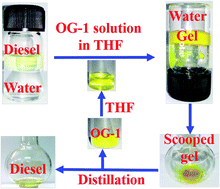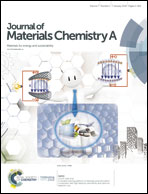Phase selective organogel from an imine based gelator for use in oil spill recovery†
Abstract
Marine oil spills create a serious problem for the environment by destroying ecosystems, and the adulteration of fuel oils is also a serious problem, as the optimum performance of an engine is affected by damaging its parts. To save the environment and prevent adulteration, a number of Schiff base-derived organogelators (OG-1, OG-2 and OG-3) are synthesized with different pendant groups containing anthracene, pyrene and cyclohexane moiety, respectively. They exhibit thermo-reversible gelation behavior in organic and mixed solvents. Only OG-1 produces gels in most organic solvents and also in fuel and edible oils, indicating it to be a smart gelator. It exhibits thixotropic behavior with very high yield stress, while the other gels do not exhibit thixotropic properties. Spectroscopic and X-ray studies indicate the concomitant presence of H-bonding, π-stacking and van der Waals interactions in the OG-1 gel; however, the OG-2 and OG-3 gels do not exhibit all these interactions, making weaker gels. Due to its superior gelling property, the OG-1 gel is tacitly used to detect fuel oil contamination mainly in diesel and petrol using fluorescence behavior, and the phase selective gelation of OG-1 promotes it as a successful recyclable material for oil spill recovery from oil–water mixtures, even in the presence of salts, acids and bases.



 Please wait while we load your content...
Please wait while we load your content...